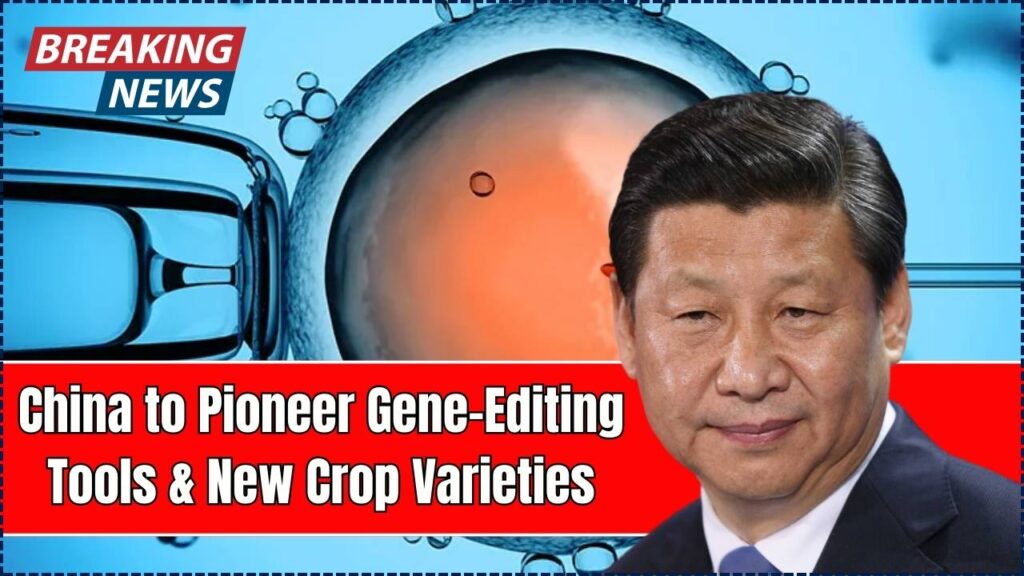
China to Pioneer Gene-Editing Tools: China is set to revolutionize global agriculture with an ambitious biotechnology initiative focused on gene-editing tools and the development of new crop varieties. This initiative aims to enhance food security, reduce reliance on imports, and position China as a leader in modern farming technologies.
As climate change, population growth, and geopolitical tensions threaten global food supplies, China’s strategic investment in precision gene-editing and high-yield crops could shape the future of sustainable agriculture. Below, we break down China’s biotech strategy, its implications, and what this means for the future of farming.
China to Pioneer Gene-Editing Tools
| Feature | Details |
|---|---|
| Initiative Timeline | 2024-2028 |
| Focus Crops | Wheat, Corn, Soybeans, Rapeseed |
| Primary Goals | Develop independent seed sources, enhance crop yields, improve resistance to diseases and environmental stresses |
| Technological Focus | Precision gene-editing tools with independent intellectual property |
| Livestock Objectives | Breed high-performance livestock with improved reproductive capacities and disease resistance |
| Official Announcement Date | February 14, 2025 |
| Source | Reuters |
China’s biotech initiative marks a turning point in global agriculture, blending science, sustainability, and economic strategy. By developing gene-edited crops and livestock, China aims to:
- Enhance food security
- Reduce import reliance
- Set global standards in agricultural innovation.
Final Thought: If successful, this could redefine farming worldwide and inspire new approaches to sustainable agriculture in countries struggling with food shortages and climate change.
Why Is China Investing in Gene Editing?
1. Strengthening Food Security
China’s rapid economic growth has increased food demand, making it heavily reliant on imports for essential commodities like soybeans and corn. In 2024, the country produced a record 706.5 million tons of grain but still aims to increase production by 50 million tons by 2030 to meet domestic consumption.
This initiative focuses on developing self-sufficient, high-yield crops that can thrive in China’s diverse and often extreme climatic conditions.
By improving agricultural resilience, China aims to reduce food shortages and price fluctuations caused by global market instability.
2. Advancing Precision Gene-Editing Technology
Unlike traditional genetic modification (GMOs), which introduces foreign DNA, gene editing alters an organism’s existing genetic code to enhance desirable traits.
China’s focus on tools like CRISPR-Cas9 and other AI-driven gene-editing systems could lead to:
- Higher crop yields without additional fertilizers.
- Drought and disease resistance to combat climate change.
- Nutrient-rich, better-tasting produce.
For instance, Chinese scientists have already developed tomatoes with 30% higher sugar content through CRISPR, making crops healthier without compromising yield.
3. Developing Independent Seed Sources
China has been dependent on foreign biotech firms like Monsanto (Bayer) and Corteva for advanced seed varieties. This initiative aims to develop a national seed bank with high-yield and disease-resistant varieties of:
- Wheat
- Corn
- Soybeans
- Rapeseed
This move enhances food sovereignty and shields China from geopolitical trade disruptions.
The Role of Livestock Gene Editing
Beyond crops, China is also focusing on genetic improvements in livestock. Gene-editing will be applied to:
- Cattle (Higher milk yields, disease resistance)
- Pigs (Improved reproduction, lower environmental footprint)
- Chickens (Disease-resistant breeds)
This could boost meat production efficiency while reducing the need for antibiotics and other chemical interventions.
China’s Regulatory Framework for Biotech Crops
Recognizing global concerns about biotech crops, China’s Ministry of Agriculture and Rural Affairs (MARA) has established strict regulations for gene-edited plants:
- Food safety assessments to prevent unforeseen health risks.
- Environmental impact studies to ensure biodiversity conservation.
- Transparency and labeling requirements for public awareness.
In April 2023, China released the “Rules for Review of Gene-Edited Plants for Agricultural Use,” outlining approval criteria for genetically improved crops. (FAS USDA)
CR450 Bullet Train: World’s Fastest Train Prototype Debuts in China! A New Era of Speed
Xiaomi HyperOS 2.1 Update – Release Date, Features, and Eligible Devices
Apple Restores TikTok on App Store – Here’s the Latest Update!
Global Implications of China’s Biotech Initiative
1. Redefining Global Agriculture
If successful, China’s gene-editing advancements could set a new global benchmark for sustainable and high-yield farming. Other nations struggling with food shortages may adopt similar models.
2. Potential for Export Market
China may export its gene-edited seeds and livestock to developing nations facing food insecurity and climate-related crop failures.
3. Competition with the U.S. and EU
While Europe remains cautious about gene editing, the U.S. has embraced CRISPR technology. China’s rapid biotech expansion could make it a global leader in agricultural innovation.
Will other nations follow China’s lead, or will regulatory roadblocks limit adoption?
FAQs On China to Pioneer Gene-Editing Tools
Q1: What is the difference between GMOs and gene-edited crops?
A: GMOs introduce foreign genes into a plant, while gene editing only modifies existing DNA to enhance traits naturally present in the organism.
Q2: Are gene-edited crops safe for consumption?
A: Yes. Chinese regulatory authorities and global organizations like the FAO and WHO have conducted safety assessments, concluding that gene-edited crops pose no greater health risks than conventional crops.
Q3: Will China’s gene-edited crops be exported?
A: While the primary goal is domestic food security, China is likely to export these biotech crops to countries facing food shortages.
Q4: When will these gene-edited crops be commercially available?
A: The initiative runs until 2028, with field trials already in progress. Commercial rollout may begin as early as 2026, depending on regulatory approvals.








